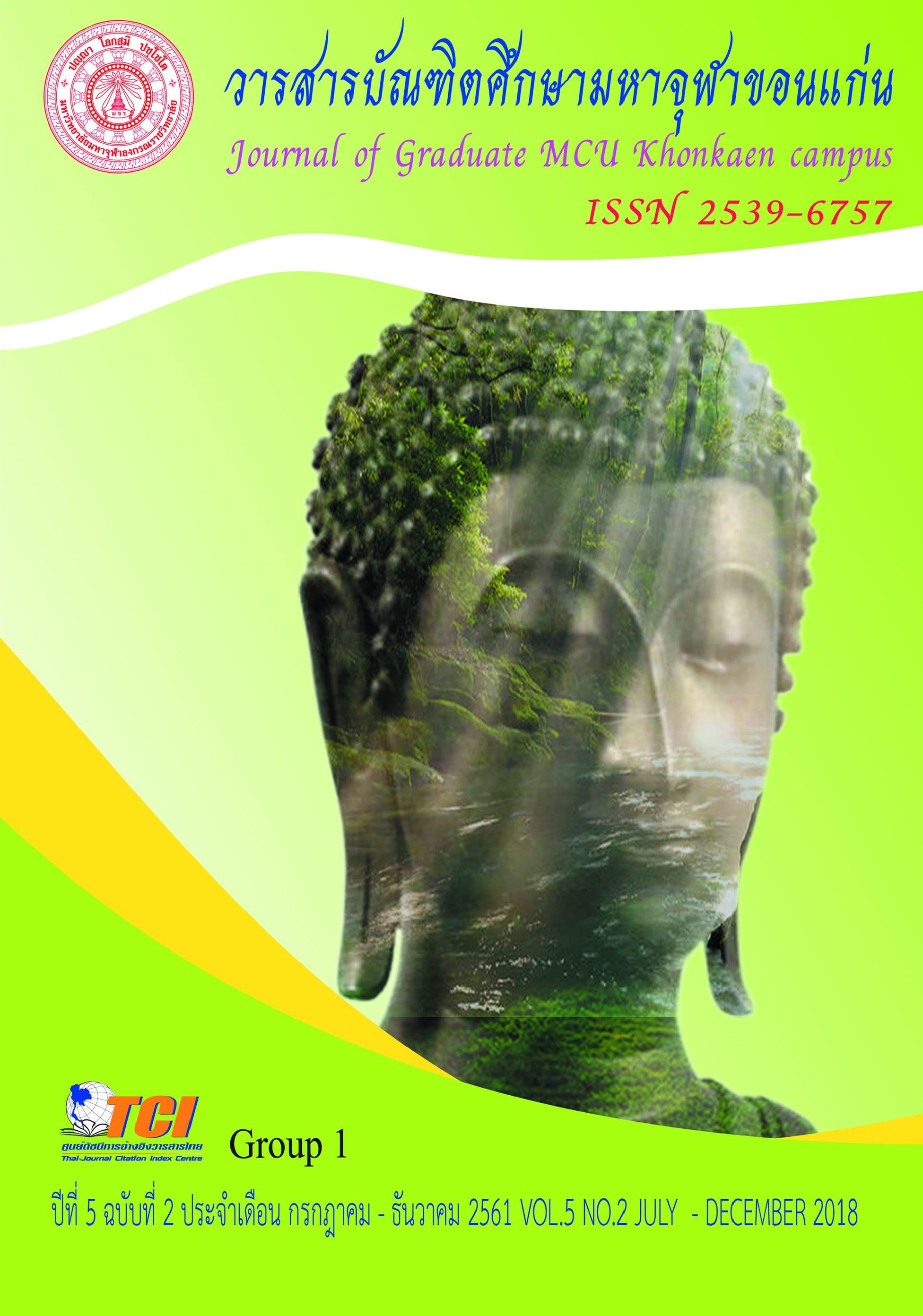การสร้างกระบวนการเรียนรู้ตามหลักไตรสิกขาเพื่อพัฒนานักเรียน ในโรงเรียนวิถีพุทธ สังกัดสำนักงานเขตพื้นที่การศึกษาประถมศึกษา อุดรธานี เขต 1
Main Article Content
บทคัดย่อ
การวิจัยเรื่องการสร้างกระบวนการเรียนรู้ตามหลักไตรสิกขาเพื่อพัฒนานักเรียนในโรงเรียนวิถีพุทธสังกัดสำนักงานเขตพื้นที่การศึกษาประถมศึกษาอุดรธานีเขต 1นี้ มีวัตถุประสงค์ เพื่อศึกษารูปแบบและกระบวนการเรียนรู้ตามหลักไตรสิกขา เพื่อสร้างกระบวนการเรียนรู้ตามหลักไตรสิกขาเพื่อพัฒนานักเรียนโรงเรียนวิถีพุทธในสังกัดสำนักงานเขตพื้นที่การศึกษาประถมศึกษาอุดรธานี เขต 1 และเพื่อเสนอแนวทางการพัฒนาการเรียนรู้ตามหลักไตรสิกขาของนักเรียนโรงเรียนวิถีพุทธ ในสังกัดสำนักงานเขตพื้นที่การศึกษาประถมศึกษาอุดรธานี เขต 1 วิธีการดำเนินการวิจัยเป็นการวิจัยเชิงคุณภาพโดยใช้การตรวจสอบเอกสาร การสังเกต และสัมภาษณ์ วิเคราะห์ข้อมูลแบบพรรณนา
ผลการวิจัย พบว่ารูปแบบและกระบวนการเรียนรู้ตามหลักไตรสิกขา คือ หลักการพัฒนาชีวิตเพื่อให้ประสบผลสำเร็จและเป็นคนสมบูรณ์แบบตามแนวพุทธ มีหลักสำคัญ 3ประการ คือ 1) อธิสีลสิกขา คือ ศึกษาเรื่องศีล อบรมปฏิบัติให้ถูกต้องดีงาม 2) อธิจิตตสิกขาคือ ศึกษาเรื่องจิต อบรมจิตให้สงบมั่นคงเป็นสมาธิ และ 3) อธิปัญญาสิกขา คือ ศึกษาเรื่องปัญญาอบรมตนให้เกิดปัญญาแจ่มแจ้ง
การสร้างกระบวนการเรียนรู้ตามหลักไตรสิกขาเพื่อพัฒนานักเรียนนั้น ทางพระพุทธศาสนาจัดวางเป็นหลักเรียกว่า ไตรสิกขา คือ ศีล สมาธิ ปัญญา ซึ่งถือว่าเป็นระบบการสร้างและพัฒนาที่ทำให้นักเรียนพัฒนาอย่างมีบูรณาการและให้มนุษย์เป็นองค์รวมที่พัฒนาอย่างมีดุลยภาพหลักทั้ง 3 ประการนี้เป็นส่วนประกอบของชีวิตที่ดีงาม ตัวการฝึกที่จะให้มีชีวิตที่ดีงามเป็นสิกขา ตัวชีวิตที่ดีงามที่เกิดจากการฝึกนั้นก็เป็น มรรค 8 แนวทางการพัฒนาการเรียนรู้ตามหลักไตรสิกขาของนักเรียนโรงเรียนวิถีพุทธ
ในสังกัดสำนักงานเขตพื้นที่การศึกษาประถมศึกษาอุดรธานี เขต 1 มี 2 แนวทาง คือ
1) แนวทางพัฒนาด้านอัตลักษณ์โรงเรียนวิถีพุทธ กลุ่มตัวบ่งชี้ใดที่ดำเนินการได้ครบถ้วนตามจุดเน้นด้านอัตลักษณ์โรงเรียนวิถีพุทธแล้วสถานศึกษาต้องรักษาให้คงอยู่อย่างยั่งยืนต่อไป กลุ่มตัวบ่งชี้ใดที่ยังมิได้ดำเนินการต้องจัดดำเนินการให้มีขึ้น และให้นำแนวทางพัฒนาที่นำเสนอไว้ในด้านกายภาพ ด้านพฤติกรรม นักเรียน ครู ผู้บริหาร ด้านกิจกรรมประจำวันพระ ด้านการส่งเสริมวิถีพุทธ และด้านการเรียนการสอนมาใช้เป็นแนวทางพัฒนาด้านอัตลักษณ์โรงเรียนวิถีพุทธ 2) แนวทางพัฒนาด้านคุณภาพการจัดการศึกษาของสถานศึกษา ให้นำแนวทางพัฒนาตามมาตรฐานที่นำเสนอไว้ในด้านคุณภาพผู้เรียน ด้านการจัดการศึกษา
ด้านการสร้างสังคมแห่งการเรียนรู้ ด้านอัตลักษณ์ของสถานศึกษา และด้านมาตรการส่งเสริม
มาใช้เป็นแนวทางพัฒนาคุณภาพการจัดการศึกษาของสถานศึกษา
The aims of this research were: to study 1) A model and learning process applying Tripitaka of Buddhist. 2) Creating a learning process applying Tripitaka to develop students in buddhist denominational schoolunder UdonThani Primary Educationnal Service Area Office 1 and
3) Guidelines of learning development applying Tripitaka of Buddhist denominational school students under UdonThani primary educational service area office 1.The research methodologies used were document studies,observation, and interview. Data analysis was done by description.
The results were as follows: Model and learning process applying Tripitakaof Buddhist are the three principles of training. The Tripitakacontains morality; good behavior training, mentality; mental goodness training, wisdom and understanding the cause of everything. The Tripitaka consists of Adhisilasikkha, training in morality, Adhicittasikkha, training in higher mentality and Adhipanna-sikkha, training in higher wisdoms.
Creating a learning process applying Tripitaka to develop students is to develop learners to the growth both in behavior, the mind and intelligence to the person completely. It can benefit for themselves and the society of their lives. Byusing the principles of the Tripitaka,the sikkha training in Tripitaka is to developthe people to have education which is the Threefold Training, means training inmorality,concentration and wisdom.TheThreefold Training can be classifiedaccording to the content of Atthangika-magga i.e. the Noble Eightfold Path i.e.bodies of doctrine. Two guidelines of learning development applying Tripitakaof Buddhistdenominational school students under UdonThani primary educational service areaoffice 1 were found as follows; 1) development methods on identity of theBuddhism Oriented School were found that the schools must sustainably continueTodevelop those identities’ indicators which were accomplished; the schools mustTake action those identities’ indicators which have not been done by utilizing theproposed development ways i.e. the physical aspect, the behaviors aspect of students, teachers, and administrators, the aspect of the Buddhist holidays’ activities,the promotion aspect of Buddhist way of life, and the aspect of learning andteaching; 2) development methods on educational administration quality of theeducational institutions can be operated by utilizing the proposed developmentmethods in various aspects i.e. the aspects of learners’ quality, educationalmanagement, learning society construction, educational institution identities, andpromotion measures.

